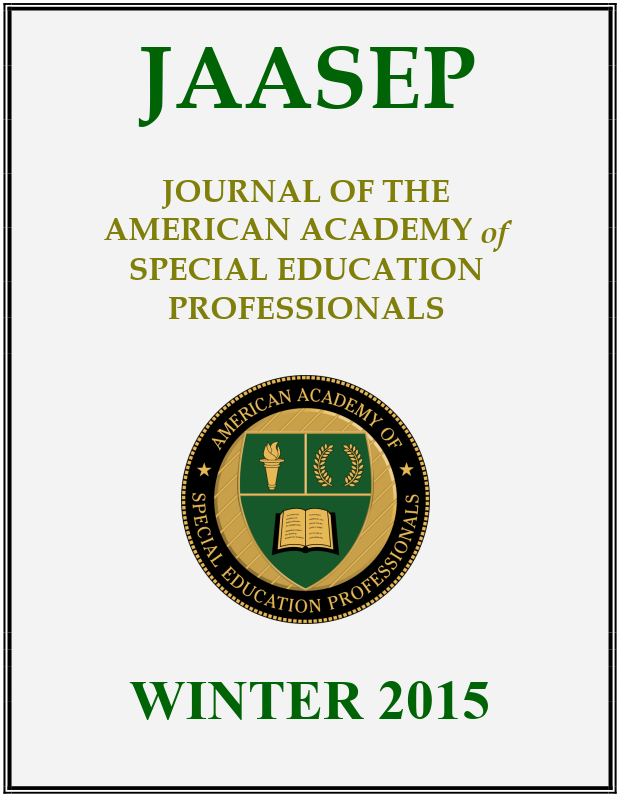Fostering Special Education Certification through Professional Development, Learning Communities and Mentorship
Aber, J., Kelly, T., & Mallory, B. (2009). The sustainable learning community: One university’s journey to the future. The New Hampshire University Press: Lebanon, NH.
Ali, P. A. (2008). Professional development and the role of mentorship. Nursing Standard, 22 (42), 35-39. DOI: https://doi.org/10.7748/ns2008.06.22.42.35.c6579
Bonk, C., Ehman, L., Hixon, E., & Yamagata-Lynch, L. (2002). The pedagogical TICKIT: Web conferencing to promote communication and support during teacher professional development. Journal of Technology and Teacher Education, 10(2).
Bray-Clark, N. (2005). Toward a construct validation of the Louisiana school analysis model instructional staff questionnaire. Unpublished doctoral dissertation, Louisiana State University, Baton Rouge.
Buysee, V., Winton, P., & Rous, B. (2009). Reaching consensus on a definition of professional development for the early childhood field. Topics in Early Childhood Special education, 28(4), 235-243. DOI: https://doi.org/10.1177/0271121408328173
Dettmer, P.,Thurston, L. P., Knackendoffel, A., & Dyck, N. (2009). Collaboration, Consultation and Teamwork for students with special needs, Sixth edition. Boston: Allyn and Bacon. Friend, M. & Cook, L. (2010). Interactions: Collaboration Skills for School Professionals (6th Ed.), Boston: Pearson, Allyn and Bacon.
Fullan, M., Rolhesier, C., Mascall, B., & Edge, K. (2001). Accomplishing large Scale reform: A tri-level proposition. Manuscript. Toronto, Canada: Ontario Institute for Studies in education, University of Toronto. Retrieved November 5, 2008 from http://sustainability2002.terc.edu/invoke.cfm/page/70.
Goddard, R. D., LoGerfp, L. & Hoy, W. K. (2004). High school accountability: The role of perceived collective efficacy. Educational Policy, 18(3), 403-425. DOI: https://doi.org/10.1177/0895904804265066
Hord, S. A. (1997). Professional learning communities: Communities of continuous inquiry and improvement. Austin, TX: Southwest Educational Development Lab. (ERIC Document Reproduction Service No. ED410695.
Hord. S. M. (Ed.). (2004). Learning together, leading together: Changing schools through professional learning communities (pp. 1-4). New York: Teachers College Press. Knapczyk, D., Frey, T., & Wall-Marencik, W. (2005). An evaluation of web conferencing in online teacher preparation. Teacher Education and Special education, 25 (2).
Kuo, J., Song, H., Smith, R., & Franklin, T. (2007). A comparative study of the effectiveness of an online and face-to-face technology applications course in teacher education. International Journal of Technology in Teaching and Learning, 3(2), 85-94.
Louisiana Department of Education (2009). Application of NCLB Highly Qualified Definition to Special education Teachers. Retrieved November 5, 2008 from http://www.doe.state.la.us/lde/tsac/1790.html
No Child Left Behind Act of 2001. Title I, Part F, Sections 1606, Local use of funds and 1608, quality initiatives. Retrieved October 10, 2008, from http://www.ed.gov/print/policy/elsec/leg/esea02/pg13.html
Rodes, P., Knapczyk, D., Chapman, C., & Chung, H. (2000). Involving teachers in web-based professional development. THE Journal, 27(10), 94.
Yoon, K. S., Duncan, T., Lee, S. W.-Y., Scarloss, B., & Shapley, K. (2007). Reviewing the evidence on how teacher professional development affects student achievement (Issues & Answers Report, REL 2007-No. 033). Washington, DC: U.S. Department of Education, 156 Institute of Education Sciences, National Center for Education Evaluation and Regional Assistance, Regional Educational Laboratory Southwest. Retrieved from http://ies.ed.gov/ncee/edlabs/regions/southwest/pdf/REL_2007033.pdf http://64.78.6.92/library/schoolbasedlitreview.pdf
Downloads
Article Information
- Article Type Articles
- Submitted December 23, 2014
- Published February 15, 2015
- Issue Winter 2015
- Section Articles
